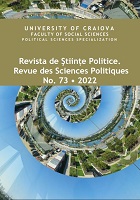EU Policies on Learning Environmental Sustainability and Climate Change: What Social Implications for Human and Organizational Development and Resilience?
EU Policies on Learning Environmental Sustainability and Climate Change: What Social Implications for Human and Organizational Development and Resilience?
Author(s): Daniel Alin Olimid, Anca Parmena OlimidSubject(s): Politics, Energy and Environmental Studies, Environmental and Energy policy
Published by: Editura Universitaria Craiova
Keywords: EU; human development; learning environmental sustainability; organizational development; climate change;
Summary/Abstract: This article outlines the recent developments in European Union (EU) legislation on learning environmental sustainability (LES) since the 2000s. The main findings focus on the legal provisions of the: (i) European Commission (EC) Staff Working Document SWD/2022/3 final aimed to outline the key topics of LES; (ii) the Regulation (EU) 2021/1119 on climate change (CC) and climate neutrality (CN); (iii) the Regulation (EU) 2021/783 providing the legal framework for the LIFE programme and (iv) the Regulation (EU) 2018/1999 on EU governance in the sector of energy and climate action (CA). Therefore, the study reviews the action areas and the strategic decision making and evaluates seven mechanisms and policy responses, namely: (a) green transition (GT) and CC; (b) education; (c) training programmes; (d) EU governance and preparedness actions to sustainability; (e) approaches to key competencies; (f) COVID-19 challenges and societal and institutional responses to public health crisis (PHC); (g) key skills for GT. Thus, our findings show how the legal provisions for LES, CC and PHC can develop collaborative governance at the EU level. Moreover, the research considers three approaches for GT within the 2016 Skills Agenda (SA) namely: (i) first, the complex approach to “community engagement”; (ii) second, the specific aim of learning and involvement; iii) third, the development of additional requirements regarding human development (HD) and organizational development (OD). In conclusion, these developments consider new approaches to GT and LES giving a complex overview of the HD and OD.
Journal: Revista de Științe Politice. Revue des Sciences Politiques
- Issue Year: 2022
- Issue No: 73
- Page Range: 114-121
- Page Count: 8
- Language: English

